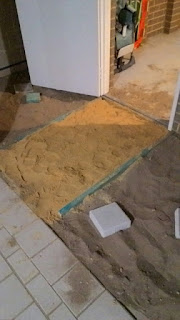The garage was concreted and the alfresco area was paved by the builder. Everything else wasn't. Thus I was left with a moat of dirt all around the house. So I was left with a silly situation where the garage was not join to the house by a hard path. I thought I shouldn't leave things like that before moving day.
That night when I cut out all power tools activities, I told myself to do a bit more work in silence. Though I was exhausted, I managed to motivate myself enough to snoop around the skip bins around the estate. There were many sites on construction. So it was a great place for waste material recycler like me. This deserves a post by itself in future.
Anyway, I picked up some pieces of timber and sawed them quietly to the length I wanted with a hand saw. They would make good flanking barricades for my temporary pavings. Then I scooped discarded sand outside and used them to my needs. I was new to pavings. I was told by many that it was impossible to do a good paving job without machinery. Everyone had a different reasoning. Some made sense to me, some didn't. I would only know who was right if I attempted it myself. So I did.
Without a single paving related tool. I could only pave them straight, so that I could avoid doing any cuts to pavers. Should I stagger them like what it ideally should be, I would need "half cuts" in order to make the pavement complete. One of the harder task, according to a colleague, was the proper compaction of sand. For failing to do a proper compaction would result in uneven pavings later down the road. That was fair enough. However, I argued on the fact that while a compaction machine could do the job a lot faster, it might not necessarily do the job to a level that was unattainable by human effort.
I would leave that for a later date. Meanwhile, I completed the temporary pavement before I decided to call it a day. The final row required a paving smaller than the standard size, so I left it unpaved. The sub-standard work left me ashamed. Yet I felt empowered that I did things like that with literally my bare hands and just a hammer. Little did I know I would improve by leaps and bounds later by, you know it, doing more of it.
When my wife was a young lady, one of her favourite phrase was, "Do what you think you cannot do and you will realise who you really are." She often used that on me. There are variations of the statement out there but they all meant the same thing. It is meant to be an encouragement for someone to break limits. Jen will remember how I would retort every time she said that. I would go, "Do what you think you cannot do and you will realise what an idiot you are."
We should know our limits, lest we set ourselves a life-crushing goals that take the wind out of us. Sometimes we never recover from setbacks from failure, scarred for life. To put things simply, try jumping across a 5m wide ditch. You know you cannot make it. You don't need to try impossible goals to know how idiotic you are. However, if achieving the goal is a must, you can consider doing things differently. It can be accepting lower standards or adjusting the lead time taken to fulfill it. Like using a ladder to cross that ditch if building a bridge is too expensive.
The little pavement might look stupid, but it would be addressed in due time. An idiot does not give up.

